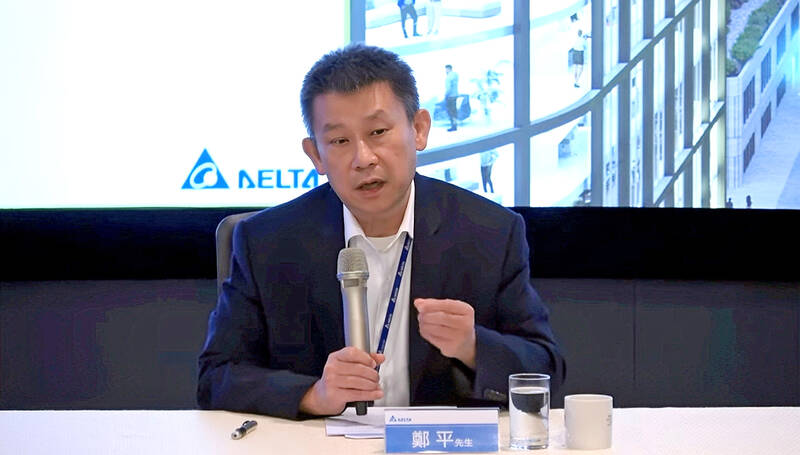Power supply and electronic components maker Delta Electronics Co (台達電) yesterday said it is optimistic about its revenue outlook this quarter, as major US hyperscalers continue to increase capital expenditure in artificial intelligence (AI) data centers, boosting demand for the company’s power supply and heat dissipation products.
The revenue outlook for the first quarter of next year is also positive, Delta Electronics chairman Ping Cheng (鄭平) told an investor conference in Taipei yesterday.
The company’s forecast is based on the consumption that hyperscalers would not slow down AI data investment in the short term.

Photo courtesy of Delta Electronics Co
Delta expects power supply unit shipments to grow quarterly this quarter, particularly those used in AI-related products.
Gross margin is expected to remain stable this quarter, thanks to improving product portfolios, the company said.
Delta on Wednesday reported record-high net profit for last quarter. Net profit last quarter rose 33.3 percent from a quarter earlier and 50.7 percent from a year earlier to NT$18.61 billion (US$605.9 million).
Earnings per share increased to NT$7.16, compared with NT$5.37 in the previous quarter and NT$4.75 a year earlier.
Gross margin fell to 34.87 percent last quarter from 35.5 percent in the second quarter, due to a broader product portfolio, as well as inventory and unfavorable exchange rates, Delta said.
Operating margin improved to 16.5 percent last quarter from 15.1 percent in the previous quarter.
Third-quarter revenue rose 21.1 percent quarter-on-quarter and 33.9 percent year-on-year to NT$150.32 billion.
During the first nine months, AI-related power supply units accounted for 23 percent of the company’s revenue, surpassing the 20 percent share estimated by the company earlier.
To mitigate capacity tightness, Delta said three new plants in Thailand would start operations by the end of this year.
Delta plans to spend NT$40 billion on new equipment and facilities this year, and plans to spend a similar amount next year.

Sweeping policy changes under US Secretary of Health and Human Services Robert F. Kennedy Jr are having a chilling effect on vaccine makers as anti-vaccine rhetoric has turned into concrete changes in inoculation schedules and recommendations, investors and executives said. The administration of US President Donald Trump has in the past year upended vaccine recommendations, with the country last month ending its longstanding guidance that all children receive inoculations against flu, hepatitis A and other diseases. The unprecedented changes have led to diminished vaccine usage, hurt the investment case for some biotechs, and created a drag that would likely dent revenues and

Macronix International Co (旺宏), the world’s biggest NOR flash memory supplier, yesterday said it would spend NT$22 billion (US$699.1 million) on capacity expansion this year to increase its production of mid-to-low-density memory chips as the world’s major memorychip suppliers are phasing out the market. The company said its planned capital expenditures are about 11 times higher than the NT$1.8 billion it spent on new facilities and equipment last year. A majority of this year’s outlay would be allocated to step up capacity of multi-level cell (MLC) NAND flash memory chips, which are used in embedded multimedia cards (eMMC), a managed

CULPRITS: Factors that affected the slip included falling global crude oil prices, wait-and-see consumer attitudes due to US tariffs and a different Lunar New Year holiday schedule Taiwan’s retail sales ended a nine-year growth streak last year, slipping 0.2 percent from a year earlier as uncertainty over US tariff policies affected demand for durable goods, data released on Friday by the Ministry of Economic Affairs showed. Last year’s retail sales totaled NT$4.84 trillion (US$153.27 billion), down about NT$9.5 billion, or 0.2 percent, from 2024. Despite the decline, the figure was still the second-highest annual sales total on record. Ministry statistics department deputy head Chen Yu-fang (陳玉芳) said sales of cars, motorcycles and related products, which accounted for 17.4 percent of total retail rales last year, fell NT$68.1 billion, or

In the wake of strong global demand for AI applications, Taiwan’s export-oriented economy accelerated with the composite index of economic indicators flashing the first “red” light in December for one year, indicating the economy is in booming mode, the National Development Council (NDC) said yesterday. Moreover, the index of leading indicators, which gauges the potential state of the economy over the next six months, also moved higher in December amid growing optimism over the outlook, the NDC said. In December, the index of economic indicators rose one point from a month earlier to 38, at the lower end of the “red” light.